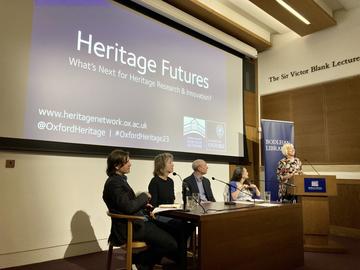OUHN Summer event: Heritage Futures
Dr Josephine Neil

On Wednesday 7 June, the Oxford University Heritage Network hosted a summer panel event and celebratory drinks reception at the Weston Library, with the topic ‘Heritage Futures: What’s next for Heritage Research and Innovation?’ The event brought together colleagues from across the University of Oxford, including members of the OUHN Steering Group, and external heritage specialists to consider future opportunities for innovative heritage research and engagement in light of social, political and environmental change.
The panel included Professor Amy Bogaard, Head of the School of Archaeology, Dr Sterling MacKinnon III from the School of Geography and Project Manager for Kick-Starting Heritage Innovation, Lizzie Glithero-West, Chief Executive of the Heritage Alliance, and Dr Rupert Goulding, Head Curator of the National Trust. The discussion was chaired by Professor Heather Viles, Co-Lead of the Oxford University Heritage Network and Professor of Biogeomorphology and Heritage Conservation.

The first part of the discussion focused on heritage/academic partnerships, including challenges and progressive steps forward. The heritage sector was deemed compartmentalized, when concerted efforts needed to be made to dissolve disciplinary boundaries and create more diverse opportunities for researchers and for those working outside of the University. This would also be beneficial to those working in heritage organisations, such as the National Trust, which is invested in promoting charitable purpose, interpretation and engagement. From their perspective, new research needs to enable, to be inclusive and reach more diverse audiences. As an industry, there is a need to think about material aspects such as climate change, landscape, and how to create meaning in a context that is constantly shifting. Indeed, change and preparing people for that change, is an integral part of heritage’s long-term picture.
The emphasis of the discussion continued to engage with the concept of ‘barriers’ in heritage, but also to acknowledge where heritage values provide the fundamental framework in which solutions can be found to other policy problems and what we are doing to level up. For example, it is important to assess how heritage is dealing with climate change, but also to see where it is part of the solution; the future of research is crucial to this and to the formation of government policy. Action points discussed included University departments facilitating collaborations, where possible, in order to blur the obstacle of subject boundaries, particularly in Geography, and attend to the needs of cutting-edge research at the doctoral level. Collaborations are also important for skills-growth in order to apply solutions and tackle the larger, longer-term questions of diversity and inclusion, climate change, digital engagement, the future of collections, and so on.
Some of the ingredients the panel considered essential to successful academic and heritage partnership included trust and having a structured partnership arrangement, combined with a realistic timeframe in which a collaborative project could grow organically. Both theorists and practitioners of industry would then have a meeting of minds that enables research to be deployed on a practical level. Examples of productive relationships include micro-internships, which have been made available through the Oxford University’s Heritage Network and National Trust Partnership. There is also a need to engage with different agendas and complexities, such as biodiversity, in which heritage can drive change in the status quo.
Following the panel discussion, the floor was opened to audience questions ranging from where heritage is heading with technological and digital advances, to what the Oxford University Heritage Network is doing to influence funders. One audience member asked what the next points of action for the Network are, and the panel subsequently addressed how to leverage themes into structural support for research, introduce cross-disciplinary grants to foster and support disciplinary leaps and to engage larger institutions with the mechanisms to find funding.
The panel were unanimous in emphasizing the Heritage Network as a great founding stone on which to build, to foster partnerships and to ascertain the means by which sources of funding can be utilized in order to build innovative projects.
The Oxford University Heritage Network was established in 2018 with the aim of bringing together researchers and heritage professionals to address the big challenges facing heritage locally, nationally and internationally. We achieve this through seminars and events, and by engaging with policy makers in government, international organisations, the private sector and the NGO community.
To sign-up to the OUHN mailing list please see the website.
The National Trust Partnership



